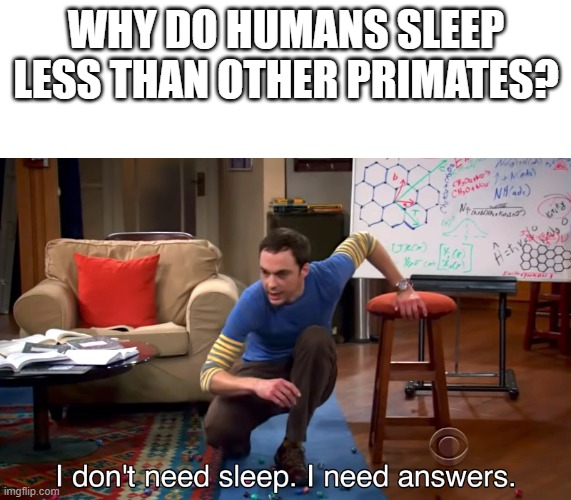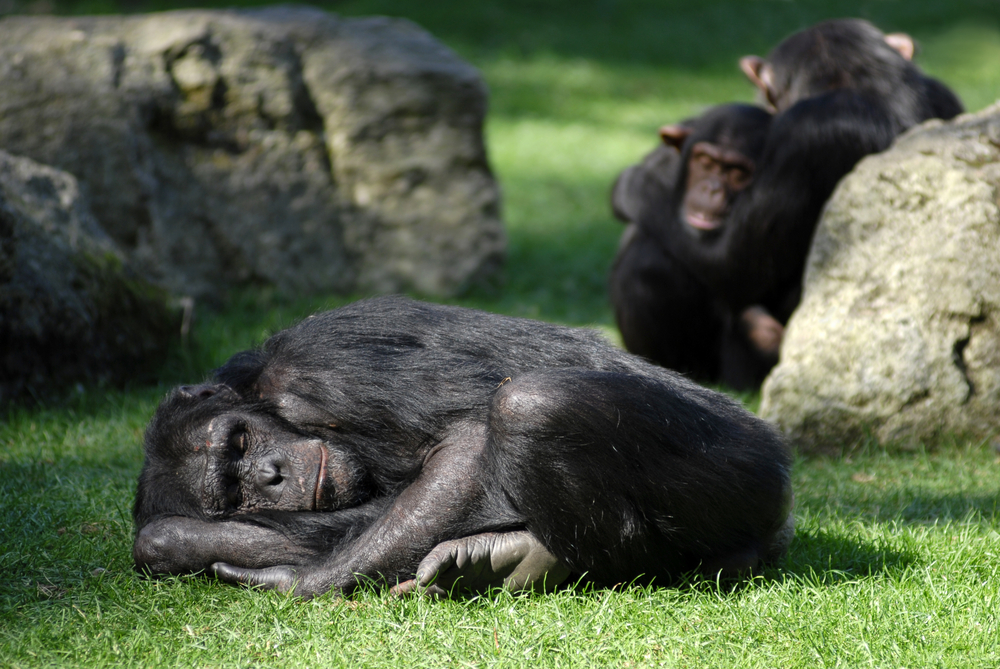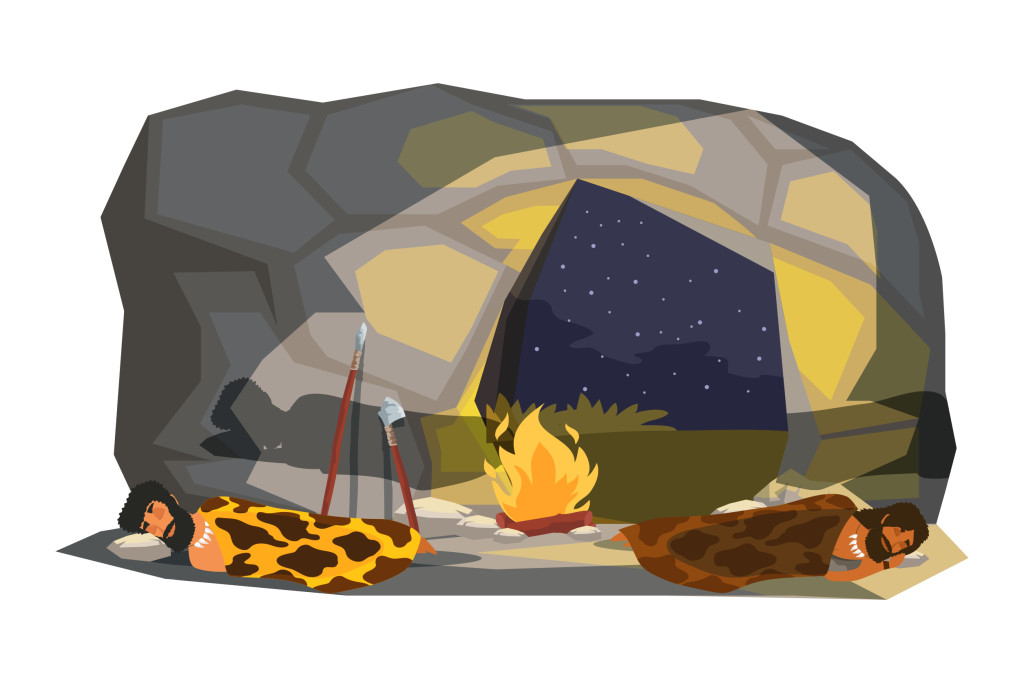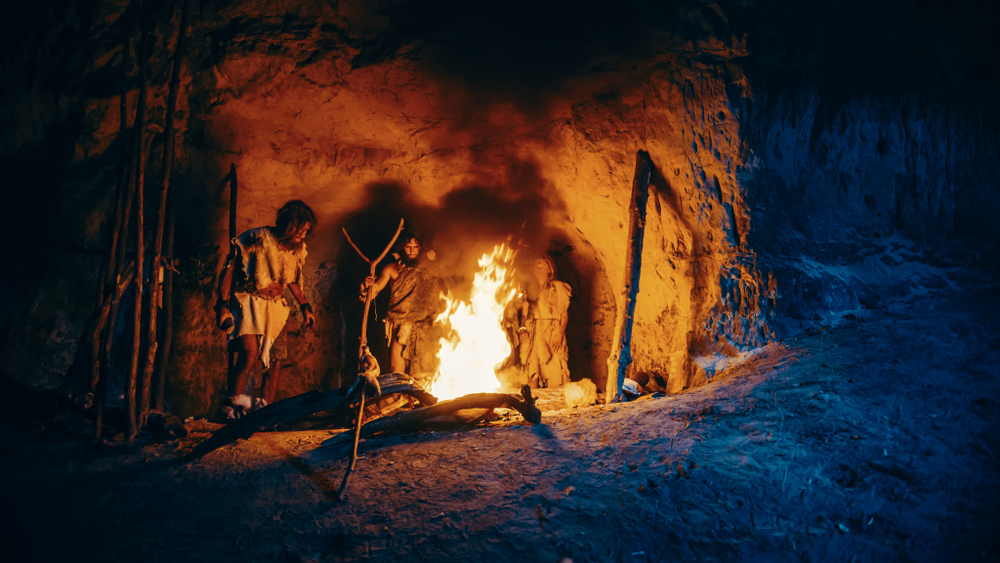Table of Contents (click to expand)
Researchers have proposed two hypotheses for why we sleep less than many other primates: the social sleep hypothesis (we sleep on the ground in large and therefore safer groups) and the “sleep intensity hypothesis” (we sleep more intensely and spend more time in REM sleep than our primate cousins).
As a general recommendation for optimal health, adults need about 8 hours of sleep every night. Add that up over the course of your life and it amounts to one-third of your life that you spend asleep.
If spending one-third of your life sleeping sounds like a bit too much, consider that many of our primate relatives sleep for around 9 (our closest relative, the chimpanzee) to 17 (three-striped night monkey) hours each day. In fact, we sleep the least among our primate cousins.
There’s an irony here, of course. We work and toil and slog away at our tiresome jobs, and then spend the night binging on Netflix, while our primates cousins with none of these industrial burdens snooze peacefully for 2 to 10 more hours than we do every day!
Keeping in mind that we depend on sleep for vital physiological and neurological functions, isn’t it ironic that humans sleep the least of any primates?

Why Do We Sleep Less Than Primates?
Researchers think that human sleep patterns changed when we moved from sleeping in trees to sleeping on the ground. Our ancestral primates were likely arboreal, and would sleep in tree holes to avoid predators. Over time, primates got larger and reached a point where sleeping in a hole in a tree was no longer a viable option.
The transition from tree to ground was a risky move for early primates. Sleeping on the ground is dangerous. Humans are the only primates that are ground sleepers (with the exception of male chimpanzees and gorillas, where the threat of predation is low).
To explain how humans overcame these risks, researchers proposed a “social sleep hypothesis“. This idea suggests that early humans formed a socio-technological group that enabled them to have both short and high-quality sleep. The use of fire and sheltered dwellings further secured the sleeping conditions for more restful slumber!

Another reason why humans sleep less than other primates has to do with the type of sleep we get. We spend more time in REM sleep than other primates. Humans spend around 20-25% of their sleep time in REM sleep, while primates like mouse lemurs and African green monkeys barely spend 5% of their sleep time in the REM cycle. The more time an animal spends in REM sleep, the more quickly they complete their needed sleep quota.
In 2015, Samson and Nunn came up with the “sleep intensity hypothesis”. It states that the evolutionary shifts in the human sleep environment (i.e., from tree to ground) have allowed sleep quality to improve by allowing for deeper sleep. They credit this change in sleep behavior to the overall pattern of efficient sleep in humans. The high sleep quality and increased net activity time could be why we have such a cognitive and behavioral advantage.
As we socialized in our groups, often late into the night, we sacrificed sleep. These social activities became so important for our reproductive success that natural selection favored the expansion of these activities into the night, in lieu of extra hours of slumber.

On the basis of the social sleep hypothesis, the researchers predict that the temperature, the size of the group, and the elements of protection were the original drivers of short but high-quality and flexible sleep in humans.
Also Read: Do Plants And Trees Sleep?
Do We Sleep Less Because Of Industrialization And Electricity?
Others argue that before the discovery of electricity, humans slept longer, as their sleep cycle was synchronized with the sunlight. The setting sun was indicative of an approaching bedtime. As industrialization struck humanity and light bulbs made it possible to stay active even during the darkness of night, humans started spending less time asleep. However, recent studies argue otherwise.

A team of researchers studied the sleeping patterns of three pre-industrialized societies from Tanzania, Namibia and Bolivia. To their surprise, they found that these groups slept for an average of 6.4 hours, which is nearly identical to the sleep duration of the industrialized population. Another study conducted on the Haitian community reveals that they also sleep for an average of 7 hours.
This shows that the discovery of electricity and the technological inventions that followed had very little effect on our general sleep duration. Instead, nature found less sleep to be more favorable for the human race!
Also Read: Why Do Teenagers Always Want To Go To Sleep Late?
How well do you understand the article above!

References (click to expand)
- Nunn, C. L., & Samson, D. R. (2018). Sleep in a comparative context: investigating how human sleep differs from sleep in other primates. American Journal of Physical Anthropology, 166(3), 601-612.
- Why Humans Sleep Less Than Their Primate Relatives. Smithsonian
- Samson, D. R. (2021, October 21). The Human Sleep Paradox: The Unexpected Sleeping Habits of Homo sapiens. Annual Review of Anthropology. Annual Reviews.
- Capellini, I., Barton, R. A., McNamara, P., Preston, B. T., & Nunn, C. L. (2008, July). Phylogenetic Analysis Of The Ecology And Evolution Of Mammalian Sleep. Evolution. Wiley.
